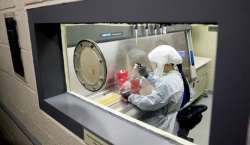Omicron variant to be detected in 20 minutes by molecular diagnosis test: Report
POSTECH announced on the 10th that a research team led by Professor Lee Jung-wook of the Department of Chemical Engineering has developed molecular diagnostic technology that can detect the Omicron variant in just 20-30 minutes and will publish the results online.

Korean researchers have developed molecular diagnostics technology that can detect Omicron variants. The technology development has been currently completed, and it is expected to take time for commercialization.
POSTECH announced on the 10th that a research team led by Professor Lee Jung-wook of the Department of Chemical Engineering has developed molecular diagnostic technology that can detect the Omicron variant in just 20-30 minutes and will publish the results online.
Omicron is a variant in which 26-32 mutations in the spike, which is used to infect cells by the COVID-19 virus.
According to the research team, molecular diagnostics technology can distinguish mutations at the single-nucleotide base, so it can detect 'Stealth Omicron,' which are difficult to be detected by PCR tests.
Currently, the Korea Centers for Disease Control and Prevention is using three methods to detect COVID-19 variants: whole-genome analysis, target DNA (mutations such as spike protein) analysis, and PCR test.
In the case of the Delta variant, it can be detected by the current PCR test, but Omicron cannot.The newly developed technology this time is not a sequencing method that reads DNA or RNA sequences, but the molecular diagnostic technology.
The existing technology screens only specific areas of the virus, but the molecular diagnostic technology was designed to cause nucleic acid-binding reactions only when the COVID-19 RNA exists, enabling rapid detection.
According to Professor Lee, Omicron has a strong signal for N genes in PCR tests but has a weak signal for S genes. In the case of 'Stealth Omicron,' both N and S genes confirmed positive, making it difficult to distinguish from other variants. The molecular diagnostic technology works in different mechanisms from PCR, detecting the Omicron variant efficiently.
Unlike conventional technology that generally processes up to 96 samples per device, the new technology can process more than 125 in 30 minutes (more than 250 samples per hour). In addition, this technology does not need specialized equipment, thus can make diagnostic kits simply and easily.
As the method can develop the diagnosis kit in 4 days, it is expected to respond quickly even if a new variant or virus occurs in the future.
"I hope the disclosure of this technology will help us return to normal daily life as soon as possible," said Professor Lee. "We will try to quickly diagnose and respond to new variants that may come out after COVID-19."
This technology is currently before commercialization. However, it can be used as an auxiliary in current situations where the PCR test for Omicron has not been developed.
Professor Lee said, "I think this technology will be close to commercialization in the second half of next year after clinical trials. The reason why I disclose the technology is to share it with others to develop better technologies for overcoming COVID-19 and to allow underdeveloped countries also analyze COVID-19 variants."
(With ANI inputs)
ALSO READ | Omicron Variant Live Updates I Nagpur reports its 1st Omicron case